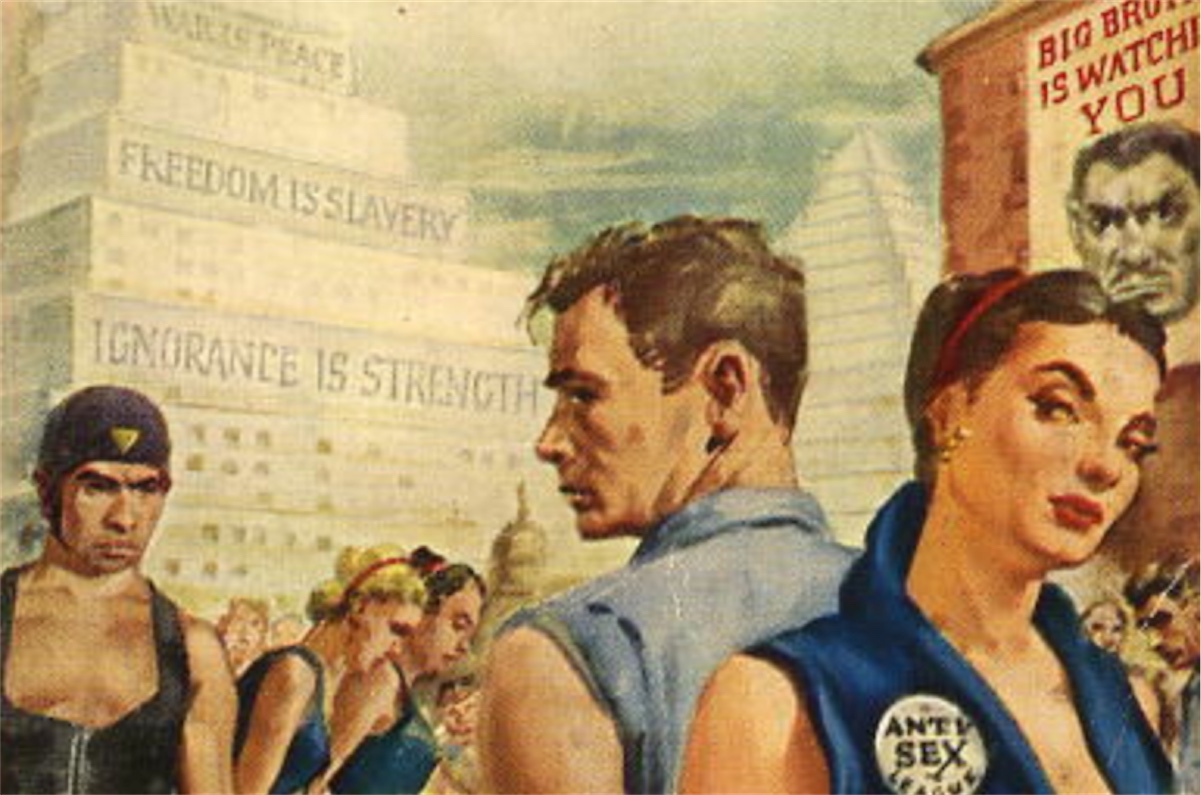
Nineteen Eighty-Four has been a byword for totalitarian dystopia longer than most of us have been reading books. But apart from its the title and certain words from its invented “newspeak” — doubleplusgood, unperson, thoughtcrime — how deeply is George Orwell’s best-known novel embedded into the culture? Most of us recognize the name Winston Smith, and many of us may even remember details of his job at the Ministry of Truth, where the facts of history are continually rewritten to suit ever-shifting political exigencies. But how much do we know about the other major character: Julia, Winston’s fellow ministry employee who becomes his clandestine co-dissident and forbidden lover?
“In some ways she was far more acute than Winston, and far less susceptible to Party propaganda,” writes Orwell in Nineteen Eighty-Four. “But she only questioned the teachings of the Party when they in some way touched upon her own life. Often she was ready to accept the official mythology, simply because the difference between truth and falsehood did not seem important to her.” Julia’s amorality throws the rigidity of Winston’s own attitudes into contrast, and also shows up their impracticality. Now, in the hands of novelist Sandra Newman, Julia will become not just star of the story but its narrator.
Or so it looks, at least, from the brief passage quoted in the Guardian’s announcement of Julia, a re-telling of Nineteen Eighty-Four approved by Orwell’s estate and to be published in time for the 75th anniversary of the original. Though it has no firm publication date yet, Julia will come out some time after Newman’s next book The Men, in which, as the Guardian’s Alison Flood puts it, “every single person with a Y chromosome vanishes from the world.” It will join an abundance of recent retellings from the woman’s point of view, including everything from “Pat Barker’s The Silence of the Girls, a version of the Iliad from the perspective of Briseis, to Maggie O’Farrell’s Hamnet, which centers on the life of Shakespeare’s wife.”
Entrusting a literary property to a writer of another era, culture, and sensibility is a tricky business, but there arguably has never been a more opportune time to put out a book like Julia. It seems the dystopia-hungry public has never been readier to identify the “Orwellian” in life, nor more responsive to re-interpretations and expansions of long-established bodies of popular myth. And what with women having conquered the world of fiction, there will naturally be great interest in Julia’s take on life under Big Brother — as well as in its inevitable television adaptation.
Related content:
George Orwell’s 1984 Staged as an Opera: Watch Scenes from the 2005 Production in London
Aldous Huxley to George Orwell: My Hellish Vision of the Future is Better Than Yours (1949)
George Orwell’s Final Warning: Don’t Let This Nightmare Situation Happen. It Depends on You!
Based in Seoul, Colin Marshall writes and broadcasts on cities and culture. His projects include the book The Stateless City: a Walk through 21st-Century Los Angeles and the video series The City in Cinema. Follow him on Twitter at @colinmarshall or on Facebook.


How to rake in cash for the minimal amount of effort, whilst still managing to claim credit as a SERIOUS AUTHOR in two easy steps:
1. Take an established, well known, book that exists within the collective consciousness of the public. Thereby ensuring loads of free publicity, whilst also ensuring you don’t have to do anything difficult like think up a plot, or characters, or a compelling world of your own.
2. “Re-write” said book by simply changing the perspective from one character to another, trying if possible to make the new main character ™ a woman. This guarantees several things: 1. You don’t have to actually do any real work (see point 1), 2: You can immediately dismiss anyone who criticises your work as the shameless cash grab it is a “misogynist”, 3: In fact you won’t even need to do that, as you’ll have a hoard of baying lunatics ready to engage in a two minute hate on anyone who doesn’t toe the party line (ironic wouldn’t you say?)
By far the most interesting character in We, the book that inspired 1984, is the female character I‑330, an actual revolutionary, unlike Julia. You can read Orwell’s 1946 review of Zamyatin’s book here: https://orwell.ru/library/reviews/zamyatin/english/e_zamy
Sounds awful. Women dont resist. They’re submissive by nature. This is just gonna be straight up pandering
There were no disabled Black vegan characters in 1984. There actually is a woman character by the name of Julia in 1984, which you’d know if you’d ever read it. What’s wrong with telling the story from her perspective?
Women don’t resist? Sophie Scholl, Josephine Baker, the Mothers of The Disapeared, the female partisans of WW2…none of these were women? You’re laughable!
It’s just a lazy and tired way to come up with a new novel. Why not write your own dystopian novel with a female perspective instead? Must be the TV rights.
The Minestry of Truth approves.
Well of course, kind of a self fulfilling prophecy